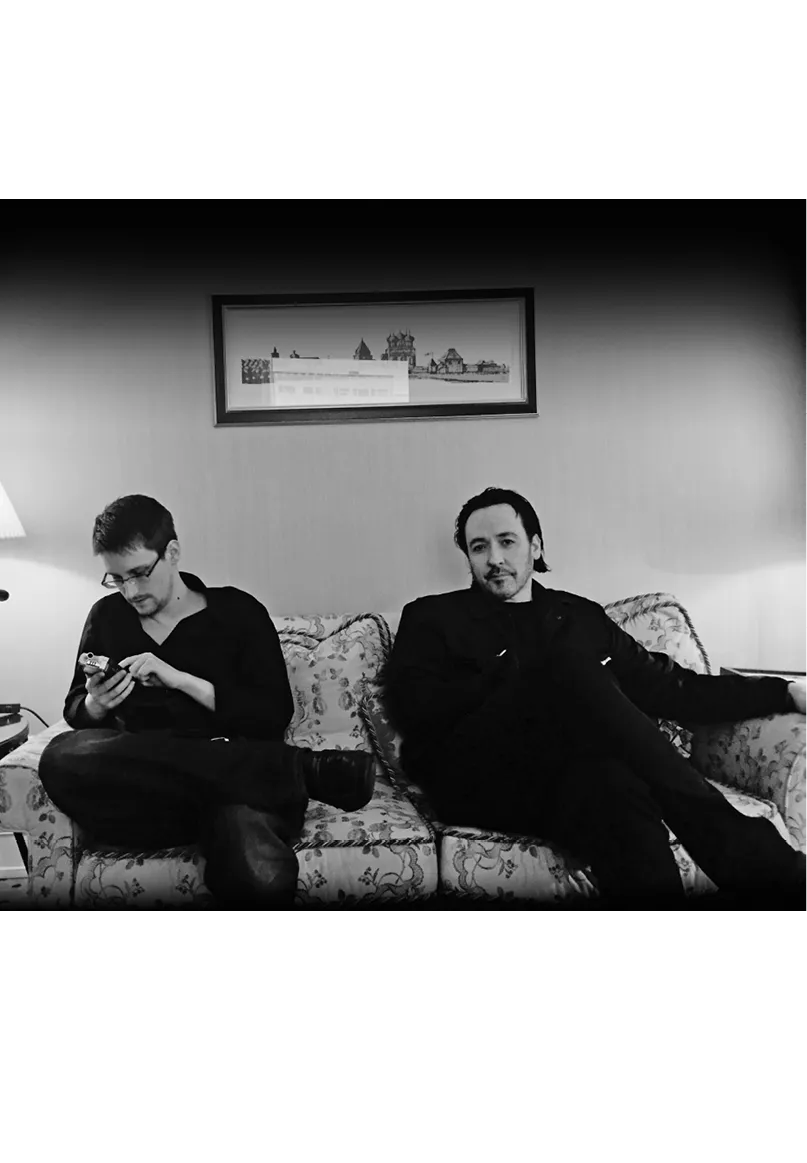![]()
John Cusack
Things That
Can and Cannot
Be Said
(Continued)
![]()
Over the next week or so, the logistics had to be planned. It was short notice and a bit of a mad scramble. Roy made her own arrangements, but I had in mind Dan Ellsberg’s history as a nuclear weapons planner for America’s retaliation to a possible Soviet first strike. In other words, he had only spent a few years of his life planning the physical obliteration of the Soviet Union. Nuclear secrets, domino theory—he was in those rooms. Then there were the 85-plus arrests for civil disobedience, one of those in Russia on the Sirius, the Greenpeace boat protesting Soviet nuclear testing. But Dan’s visa came. And mine came, too.
Meanwhile in India, some of Roy’s worst fears had materialized. Eight months before, Narendra Modi had become the new prime minister of India. (In May, I received this text: Election results are out. The fascists in a landslide. The phantoms are real. What you see is what you get.)
I met up with Roy in London. She had been there for two weeks giving talks in Cambridge and the Southbank Centre on her new work on Gandhi and B. R. Ambedkar. At Heathrow, she told me quite casually that some folks in India were burning effigies of her. “I seem to be goading the Gandhians to violence,” she laughed, “but I was disappointed with the quality of the effigy.”
We flew together to Stockholm to meet up with Dan, who was attending the ceremony of the Right Livelihood Awards—some call it the Alternative Nobel—because Ed was one of the laureates. We would fly to Moscow together from there.
The Stockholm streets were so clean you could eat off the ground.
On our first night, there was a dinner at a nautical museum with the complete salvaged wreckage of a huge 17th-century wooden warship as the centerpiece of the modernist structure. The Vasa, considered the Titanic of Swedish disasters, was built on the orders of yet another power-hungry king who wanted control of seas and the future. It was so overloaded with weapons and top-heavy, it capsized and sank before it even left the harbor.
It was a classic human rights evening, to be sure: gourmet food and good intentions, a choir singing beautiful noels. I enjoyed watching the almost pathologically anti-gala Roy trying to mask her blind panic. Not her venue, as they say. Dan was busy and in great demand, meeting people, doing interviews. We caught occasional glimpses of him—and managed to say a quick hello.
The awards ceremony took place in the Swedish Parliament. Roy and I were graciously invited. We were late. It occurred to us that if neither of us would be comfortable sitting in the parliament halls of our own countries, what the fuck would we be doing sitting in the Swedish Parliament? So we skulked around the corridors like petty criminals until we found a cramped balcony from which we could watch the ceremony. Our empty seats reflected back at us. The speeches were long. We slipped away and walked through the great chambers and found an empty banquet hall with a laid out feast. There was a metaphor there somewhere. I switched on my recorder again.
JC: What is the meaning of charity as a political tool?
AR: It’s an old joke, right? If you want to control somebody, support them. Or marry them.
(Laughter)
JC: Sugar daddy politics . . .
AR: Embrace the resistance, seize it, fund it.
JC: Domesticate it . . .
AR: Make it depend on you. Turn it into an art project or a product of some kind. The minute what you think of as radical becomes an institutionalized, funded operation, you’re in some trouble. And it’s cleverly done. It’s not all bad . . . some are doing genuinely good work.
JC: Like the ACLU (American Civil Liberties Union) . . .
AR: They have money from the Ford Foundation, right? But they do excellent work. You can’t fault people for the work they’re doing, taken individually.
JC: People want to do something good, something useful . . .
AR: Yes. And it is these good intentions that are dragooned and put to work. It’s a complicated thing. Think of a bead necklace. The beads on their own may be lovely, but when they’re threaded together, they’re not really free to skitter around as they please. When you look around and see how many NGOs are on, say, the Gates, Rockefeller, or Ford Foundation’s handout list, there has to be something wrong, right? They turn potential radicals into receivers of their largesse—and then, very subtly, without appearing to—they circumscribe the boundaries of radical politics. And you’re sacked if you disobey . . . sacked, unfunded, whatever. And then there’s always the game of pitting the “funded” against the “unfunded,” in which the funder takes center stage. So, I mean, I’m not against people being funded—because we’re running out of options—but we have to understand—are you walking the dog or is the dog walking you? Or who’s the dog and who is you?
JC: I’m definitely the dog . . . and I’ve definitely been walked.
AR: Everywhere—not just in America . . . repress, beat up, shoot, jail those you can, and throw money at those whom you can’t—and gradually sandpaper the edge off them. They’re in the business of creating what we in India call Paaltu Sher, which means Tamed Tigers. Like a pretend resistance . . . so you can let off steam without damaging anything.
JC: The first time you spoke at the World Social Forum . . . when was that?
AR: In 2003, in Porto Alegre . . . just before the US invasion of Iraq.
JC: And then you went the next year in Mumbai and it was . . .
AR: . . . totally NGO-ized. So many major activists had turned into travel agents, just having to organize tickets and money, flying people up and down. The forum suddenly declared, “Only nonviolence, no armed struggles . . .” They had turned Gandhian.
JC: So anyone involved in armed resistance . . .
AR: All out, all out. Many of the radical struggles were out. And I thought, fuck this. My question i...


